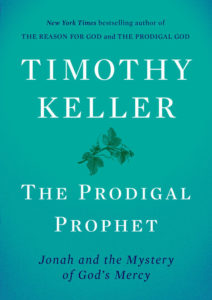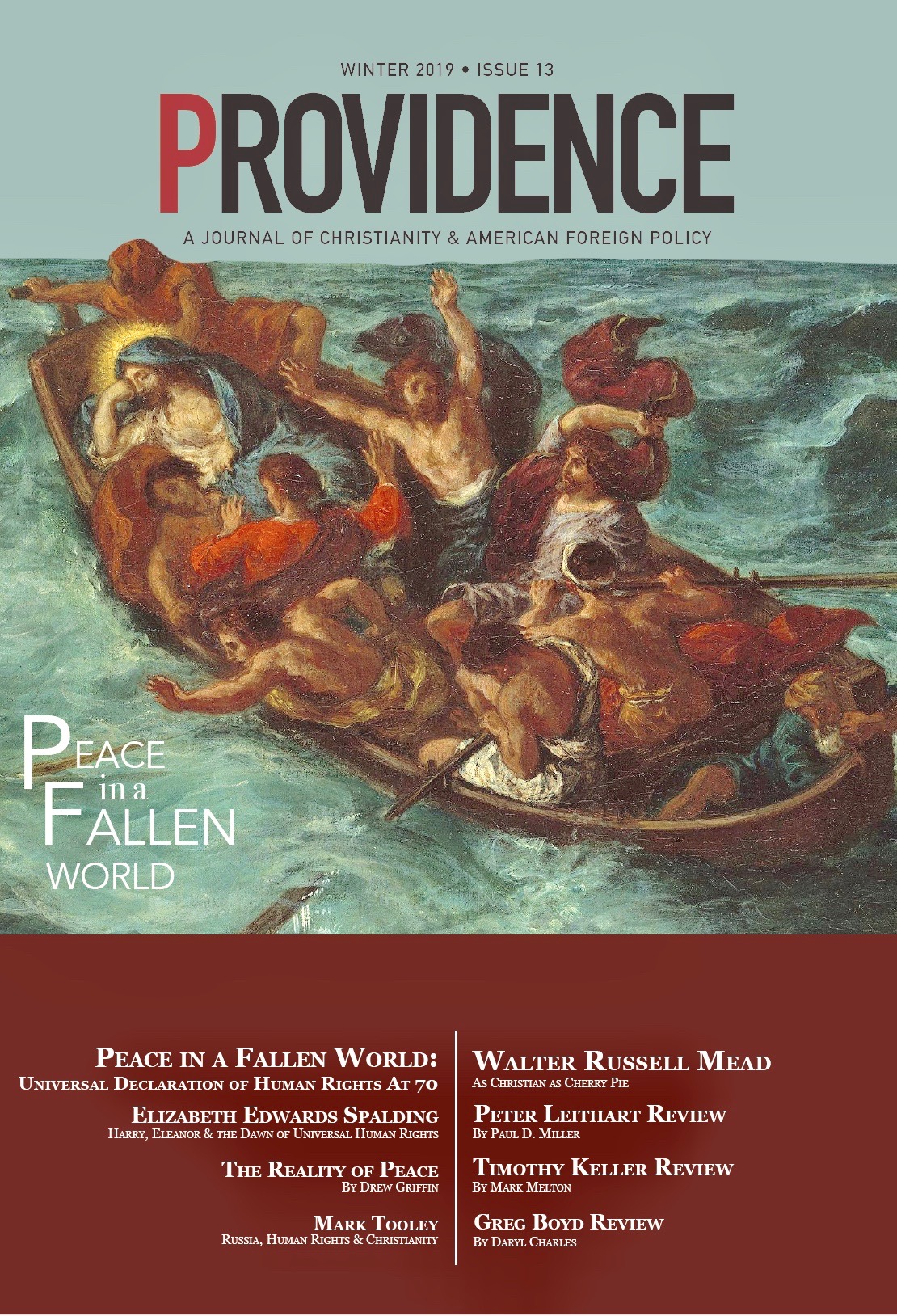A version of this book review of Timothy Keller’s Prodigal Prophet first appeared in the Winter 2019 issue of Providence‘s print edition.
Jonah is a peculiar prophet. Even though he quite deliberately disobeyed God’s explicit command to go and preach to Nineveh, capital of the cruel Assyrian Empire and location of modern-day Mosul, Iraq, he nevertheless had great success in the city. Most Christians know about his adventure with the big fish, but the book of Jonah’s mere 48 verses are filled with other lessons about rebellion, mercy, missions, and even patriotism. Timothy Keller, who started Redeemer Presbyterian Church in New York City and more recently became part of Redeemer City to City, draws upon his experience preaching through this scripture multiple times and expounds on various lessons from this contradictory prophet in his latest book, The Prodigal Prophet: Jonah and the Mystery of God’s Mercy.

Likely to be a popular book for laypeople and small group Bible studies, Prodigal Prophet is easy enough to read casually on a lazy Saturday morning, yet it can still convict dedicated Christians who think they know this book perfectly. For students and pastors who want to dive deeper, the endnotes and citations will be helpful as they study this book or prepare for sermons.
Prodigal Prophet consists of roughly two parts. The first half offers nine short chapters that are essentially sermons. They cover Jonah 1 and 2 (when the prophet runs away), sometimes focusing on only a couple verses at a time, and Jonah 3 and 4 (when he goes to Nineveh) more briefly. Prodigal Prophet’s second half includes three longer chapters that review the scripture again while offering modern lessons about readers’ relationship to God’s word, world, and grace. (For those looking for a long exposition about the great fish passage, sorry to disappoint, but Keller only mentions this in passing and notes that only a couple verses reference the fish. Though he affirms the miracle happened, he says “let’s not get distracted by the fish.”)
For Providence readers, there are three topics of particular interest from the Prodigal Prophet’s second half: justice, politics, and patriotism.
Justice & Imago Dei
As Keller notes, the book of Jonah shows that “believers should respect and love their neighbors, including those of a different race and religion.” He elaborates that Christians have a duty and obligation to treat others justly because God made them in his image (imago Dei). As Keller cites, John Calvin uses imago Dei as the reason why Christians should consider themselves debtors to neighbors and treat strangers with kindness “as the Lord deserves”: “Remember not to consider men’s evil intention but to look upon the image of God in them, which cancels and effaces their transgressions, and with its beauty and dignity allures us to love and embrace them.”
Jonah, of course, disregards those bearing God’s image who aren’t from Israel, and even the pagans show more care toward their neighbors than the prophet does. In light of this account and Jesus’ Good Samaritan parable, Keller argues:
Christians cannot think that their role in life is strictly to build up the church, as crucial as that is. They must also, as neighbors and citizens, work sacrificially for the common life and common good. What is that? In the most basic sense, it refers to things that benefit the entire human community, rather than only the selfish interests of some individuals, groups, or classes.

He then lists several examples of the common good, including a safe environment, economic prosperity, peace between nations and races, just social order, and good government. Keller notes that, while Christians should work toward the common good, this work may not convert people. After all, Jonah’s preaching did not result explicitly in conversions, but Nineveh did stop its violence. In other words, there was social reform after the prophet called them to do justice.
While the book of Jonah shows God cares about justice, Keller carefully explains that doing justice alone is insufficient; there must also be evangelism. He makes a nuanced distinction: Christians should not “insist that doing justice is all we need to do to declare God’s good news,” but nor should they “treat justice as optional work.”
Keller demonstrates how Christian faith enables believers to work toward justice. While secular society wants justice and a reduction of suffering, it also says moral values are arbitrary, subjective preferences and that people should pursue their deepest desires. Faith provides better logic, and as Keller argues, this faith has often caused Christians to have moral commitments “to human rights, equal human dignity, universal benevolence, and the interests of the poor” that would otherwise be illogical.
This issue of Providence has focused particularly on human rights, and many contributors here and elsewhere explain how imago Dei, which Keller links to pursuing justice, has helped promote human rights. However, he doesn’t mention human rights much in this book, and by my count, the phrase “human rights” appears once. Instead, Keller spends much more time discussing the more biblically sound concepts of justice and imago Dei. Whichever human rights do exist at all times in all places, they must be rooted in these two doctrines.
Politics & Ethical Package Deals
In order to pursue justice, Keller insists, Christians must become political. Abstaining from politics essentially perpetuates injustices that displease God because “no society reflects God’s justice and righteousness perfectly.” Participating in politics, Keller says, can be an act of love toward neighbors, but Christians should not label a particular policy or party as the Christian one. While the church should speak against evils like racism and injustice, how exactly a government pursues justice is a matter of wisdom and prudence, not biblical prescription. For instance, is a low-tax, low-spending policy better because it promotes economic growth that helps the poor get jobs, or is a high-tax, high-spending policy better because it funds programs that help the poor? There’s no clear-cut biblical answer, and the wisest policy may change over time as circumstances change. But Christians should participate in the debate with the goal to promote justice, even if Christians in the same church disagree with what is the best policy.
While Keller insists Christians should be involved in politics, he offers a warning to Americans. Increased political divisions today mean political parties require “ethical package deals”: members must accept all of a party’s policy positions if they want power and access. He insists, though, that neither political party fully adheres to biblical principles (because of sin, no political party will likely do so). Keller describes two options:
One is to give up and withdraw, trying to be apolitical. The second possibility is to swallow hard, assimilate, and fully adopt one party’s whole package in order to be admitted to the table. Political parties will offer Christian churches, organizations, and leaders heady access to power, support, favors, and protections. All this can be theirs if they support the whole political agenda and look the other way on matters to which Christians ought to object… Neither of these options is valid.
He then says Christians would likely experience exclusion and persecution as a consequence of not accepting the ethical package deal, but that nothing done in the name of God is done in vain.
Keller within a Niebuhrian-Augustinian Divide
Some Christians who contradict Keller on this point say they accepted a political party’s whole platform, stayed silent when they disagreed, ignored some injustice, or backed a candidate they considered evil because it was the “lesser evil.” They say Christians must make pragmatic choices, and humanity’s depravity means there will never be clear-cut political choices between good and evil. Though they rarely if ever use this terminology, they seem to be following a somewhat Niebuhrian calculation: even if the action is morally wrong and sinful, a Christian must do evil if abstaining means a greater evil would prevail. Such necessary acts may still be sin, but a Christian should get “dirty hands” now and ask for forgiveness later.
The likes of Timothy Keller and Russell Moore, president of the Ethics and Religious Liberty Commission, seem to follow a more Augustinian logic, whether they’d use the label or not: choosing the lesser evil is still evil, wrong, and sinful, so the Christian shouldn’t do it, even if a greater evil prevails. After all, by his very nature God can’t want us to choose a lesser evil because that would corrupt his goodness. Even if humans are totally depraved so that Christians sin continuously and cannot do what is good on their own, there’s still a right option God wants us to choose. If gun to the head a Christian must choose between two evils, the best option is not the lesser evil, but martyrdom.
Some readers may automatically assume I’m alluding to evangelicals who supported Donald Trump in 2016 because, even though many considered a vote for him evil, Hilary Clinton and the Democrats were a greater evil. This may explain some of their choices, but the Niebuhrian-Augustinian divide first came to my attention while editing Marc LiVecche’s articles about military ethics and the just war tradition. Specifically, is killing in war wrong (sinful)? Pacifists say yes, and therefore oppose any killing or participation in war. As LiVecche explains, Niebuhr was originally a pacifist before supporting US involvement in the world wars, but the father of Christian realism never fully abandoned his pacifist instinct. Hence, we have the conclusion that killing is wrong but in war is necessary. LiVecche and others who follow in the Augustinian just war tradition reject this position and say, while murder is wrong, killing is not necessarily a sin; in war killing may not only be morally licit but also morally required to protect innocents and ensure justice.
From where I sit, the biggest political debate today amongst American Christians revolves around this Niebuhrian-Augustinian divide, and not between, say, pacifist and just war perspectives. And I’d suspect that, in the pews at least, the Niebuhrians outnumber the Augustinians. The view may look different from a seminary classroom, but that’s not quite the real world, is it?
Of course, not every American Christian fits neatly into either the Niebuhrian or Augustinian camps described above. For instance, many Christians who use a seemingly Niebuhrian or lesser evil rhetoric to justify their political choices may believe they are doing something good instead—perhaps in this context they could be called “pseudo-Niebuhrian.” In other words, they are choosing the greater (albeit imperfect) good, not the lesser evil. Donald Trump may not have been their first or second choice, but they voted for him because they supported the good they thought he would do—such as selecting originalist Supreme Court justices—while recognizing his imperfection. They may still use a divisive, Niebuhrian lesser-evil rhetoric to rally political support for their side or criticize those who don’t fall in line.
Moreover, though I understand Keller’s concern about Christians accepting a party’s whole agenda uncritically, in my experience many Americans don’t always agree with one party or the other 100 percent. Instead of swallowing a party’s ethical package deal whole, they disagree with their party or political leaders sometimes, even if they agree with and vote for their side most of the time. For instance, a Christian could vote for Trump and support the administration’s focus on religious persecution while also criticizing his tweets or other policies, such as his original plan to abandon allies and fully withdraw troops from Syria (a decision he reversed after receiving criticism). These Christians could very well have an Augustinian perspective, even if they may appear to be in a coalition with those who have swallowed a party’s ethical package deal whole. As long as the foundation of a Christian’s political engagement is justice rooted in the image of God in others, there should be no problem with this kind of support, at least according to the logic in Prodigal Prophet.
But while many Americans may have political beliefs more nuanced than merely parroting a political party’s talking points, there are many others who have fully accepted the ethical package deal and would never criticize their side, particularly those active in public debate and including pastors and other Christian leaders. Keller thus rightly warns us to be cautious if we or others support a party 100 percent and never critique it.
Patriotism
While Keller says Christians should participate in politics because remaining apolitical perpetuates injustice, should Christians love their country and be patriotic? Many criticize Jonah for hating the Ninevites so much that he’d rather flee to Tarshish through the dangerous sea than give them God’s message. And Keller writes that Jonah “had allowed himself to become too aligned politically and emotionally with the national security interests of Israel.” Even when the prophet describes himself, he mentions his nationality first and then his faith (Jon. 1:9). Keller explains, “His race and nation have become not merely good things that he loves but idols.”
Would the correct lesson from Jonah be to abandon love of country and nation? No. While calling Jonah a racist or jingoist because he loved Israel “may make us feel virtuous, we must also do justice to the rightful love of country and attachment to one’s people and culture that is good.” Keller then explains how a Christian could be patriotic or nationalist. He leans heavily on C.S. Lewis’ Four Loves, which the First World War veteran wrote after Nazi nationalism had ripped Europe asunder. While both Lewis and Keller explain that nationalism can become a “demon when it becomes a god,” a nationalist or patriotic love can be healthy. If Christians considered all patriotisms and nationalisms wrong, then they would also have to reject Jesus’ nationalism, which we see when he laments over Jerusalem.
(In a series of articles online, I further review what Keller’s Prodigal Prophet and Lewis’ Four Loves mention about love of country, including how “love of home” can be righteous while love of a country’s history can be problematic. See “For God and Country, Part 1: Christian Patriotism,” “For God and Country, Part 2: Not Necessarily the Nation-State,” and “Immortal Memory: What Scotland’s Robert Burns Can Teach Us about Nationalism.”)
Conclusion
Overall, Keller’s Prodigal Prophet provides a good resource for both pastors and laypeople who want to better understand how lessons from the prophet Jonah apply to today’s world. He develops some of his arguments, such as on justice, in other works as well, but this book has so much other material and so many practical applications that it makes the read worthwhile. Especially for Providence readers interested in a Presbyterian view, Timothy Keller offers much on politics, society, and theology to contemplate.
Mark Melton is Providence’s deputy editor and earned his master’s in international relations from the University of St. Andrews and his bachelor’s in foreign language and international trade at Mississippi College.








 Sponsor a student for Christianity & National Security 2024
Sponsor a student for Christianity & National Security 2024